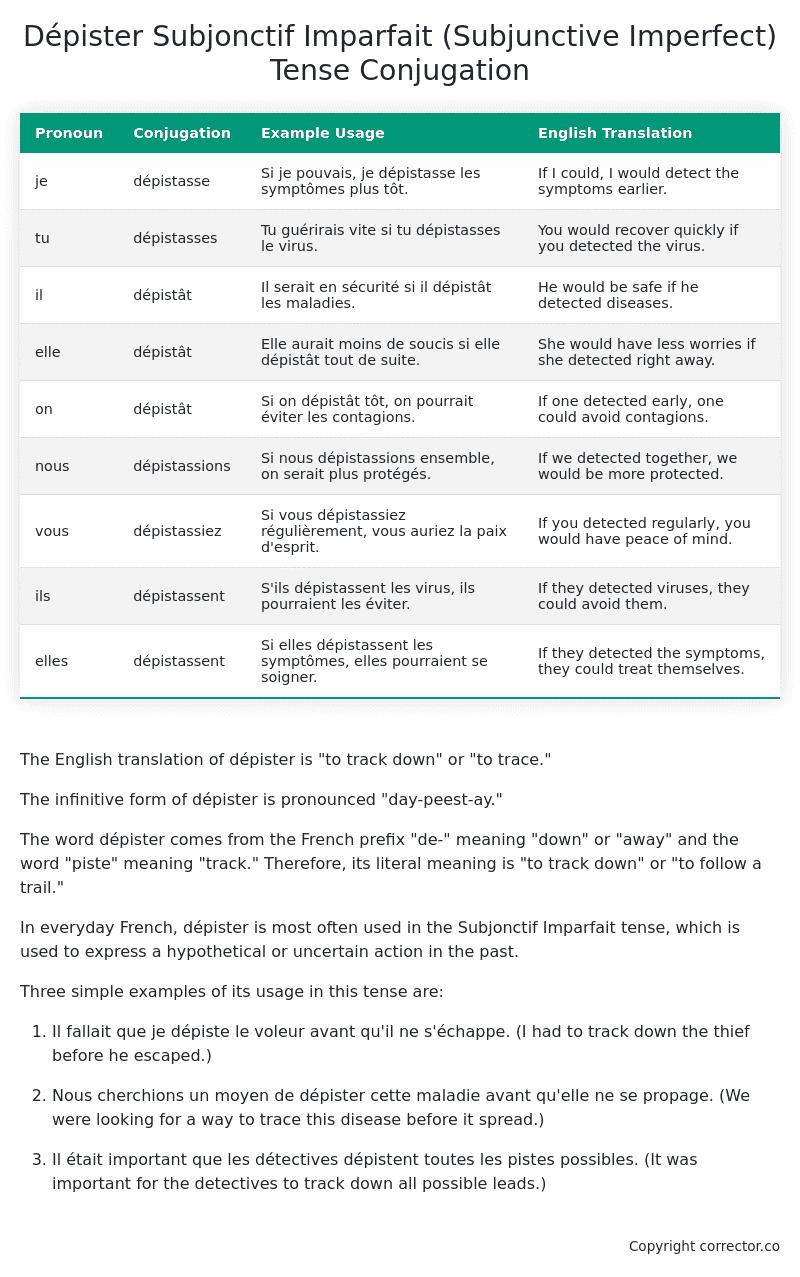Subjonctif Imparfait (Subjunctive Imperfect) Tense Conjugation of the French Verb dépister
Introduction to the verb dépister
The English translation of dépister is “to track down” or “to trace.”
The infinitive form of dépister is pronounced “day-peest-ay.”
The word dépister comes from the French prefix “de-” meaning “down” or “away” and the word “piste” meaning “track.” Therefore, its literal meaning is “to track down” or “to follow a trail.”
In everyday French, dépister is most often used in the Subjonctif Imparfait tense, which is used to express a hypothetical or uncertain action in the past.
Three simple examples of its usage in this tense are:
-
Il fallait que je dépiste le voleur avant qu’il ne s’échappe. (I had to track down the thief before he escaped.)
-
Nous cherchions un moyen de dépister cette maladie avant qu’elle ne se propage. (We were looking for a way to trace this disease before it spread.)
-
Il était important que les détectives dépistent toutes les pistes possibles. (It was important for the detectives to track down all possible leads.)
Table of the Subjonctif Imparfait (Subjunctive Imperfect) Tense Conjugation of dépister
| Pronoun | Conjugation | Example Usage | English Translation |
|---|---|---|---|
| je | dépistasse | Si je pouvais, je dépistasse les symptômes plus tôt. | If I could, I would detect the symptoms earlier. |
| tu | dépistasses | Tu guérirais vite si tu dépistasses le virus. | You would recover quickly if you detected the virus. |
| il | dépistât | Il serait en sécurité si il dépistât les maladies. | He would be safe if he detected diseases. |
| elle | dépistât | Elle aurait moins de soucis si elle dépistât tout de suite. | She would have less worries if she detected right away. |
| on | dépistât | Si on dépistât tôt, on pourrait éviter les contagions. | If one detected early, one could avoid contagions. |
| nous | dépistassions | Si nous dépistassions ensemble, on serait plus protégés. | If we detected together, we would be more protected. |
| vous | dépistassiez | Si vous dépistassiez régulièrement, vous auriez la paix d’esprit. | If you detected regularly, you would have peace of mind. |
| ils | dépistassent | S’ils dépistassent les virus, ils pourraient les éviter. | If they detected viruses, they could avoid them. |
| elles | dépistassent | Si elles dépistassent les symptômes, elles pourraient se soigner. | If they detected the symptoms, they could treat themselves. |
Other Conjugations for Dépister.
Le Present (Present Tense) Conjugation of the French Verb dépister
Imparfait (Imperfect) Tense Conjugation of the French Verb dépister
Passé Simple (Simple Past) Tense Conjugation of the French Verb dépister
Passé Composé (Present Perfect) Tense Conjugation of the French Verb dépister
Futur Simple (Simple Future) Tense Conjugation of the French Verb dépister
Futur Proche (Near Future) Tense Conjugation of the French Verb dépister
Plus-que-parfait (Pluperfect) Tense Conjugation of the French Verb dépister
Passé Antérieur (Past Anterior) Tense Conjugation of the French Verb dépister
Futur Antérieur (Future Anterior) Tense Conjugation of the French Verb dépister
Subjonctif Présent (Subjunctive Present) Tense Conjugation of the French Verb dépister
Subjonctif Passé (Subjunctive Past) Tense Conjugation of the French Verb dépister
Subjonctif Imparfait (Subjunctive Imperfect) Tense Conjugation of the French Verb dépister (this article)
Subjonctif Plus-que-parfait (Subjunctive Pluperfect) Tense Conjugation of the French Verb dépister
Conditionnel Présent (Conditional Present) Tense Conjugation of the French Verb dépister
Conditionnel Passé (Conditional Past) Tense Conjugation of the French Verb dépister
L’impératif Présent (Imperative Present) Tense Conjugation of the French Verb dépister
L’infinitif Présent (Infinitive Present) Tense Conjugation of the French Verb dépister
Struggling with French verbs or the language in general? Why not use our free French Grammar Checker – no registration required!
Get a FREE Download Study Sheet of this Conjugation 🔥
Simply right click the image below, click “save image” and get your free reference for the dépister Subjonctif Imparfait tense conjugation!

Dépister – About the French Subjonctif Imparfait (Subjunctive Imperfect) Tense
Formation
Common Everyday Usage Patterns
Interactions with Other Tenses
Subjonctif Présent
Indicatif Passé Composé
Conditional
Conditional Perfect
Summary
I hope you enjoyed this article on the verb dépister. Still in a learning mood? Check out another TOTALLY random French verb conjugation!


